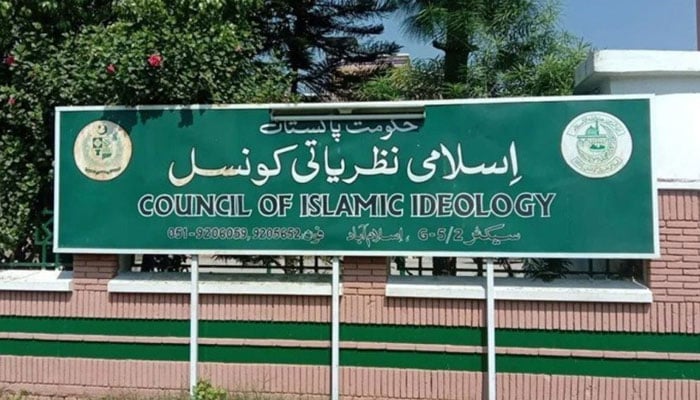CII suggestion
CII reiterated its past recommendation that special courts should be established to prosecute criminals involved in such crimes
In the aftermath of the May 25 events in Sargodha, where an angry mob took the law into its own hands, the Council of Islamic Ideology (CII) has raised its voice against the alarming culture of mob vigilantism in Pakistan. In a meeting on Wednesday, the CII reiterated its past recommendation that special courts should be established to prosecute criminals involved in such crimes. The CII is not wrong in pointing out how mobs take the law into their own hands when religious sentiments are fanned. We are not just talking about private property being damaged but about people being killed as well. In December 2021, a Sri Lankan factory manager, Priyantha Kumara, was lynched to death in Sialkot and his body burnt by a violent mob. And we remember all too well the tragedy of Mashal Khan. The recent incident in Lahore's Ichhra Bazaar where a woman was saved by the police before the mob could get out of control and harm her highlighted how rumours spread without any verification, leading to dangerous consequences. The CII's condemnation of such actions is a crucial step, but it is evident that mere words are not enough. What Pakistan urgently needs is a multifaceted approach involving government, state institutions, courts, and society as a whole to challenge and eradicate the menace of mob 'justice'.
Special courts can play a pivotal role in ensuring swift and fair justice for both the victims and the perpetrators of such heinous acts. However, the establishment of these courts must be coupled with comprehensive legal reforms to strengthen rule of law and ensure due process for all individuals, regardless of their religious or social status. There is also justifiable scepticism regarding special courts, critics arguing that such cases should be dealt with through the normal judicial process, and that a speedy trial also may not fulfil the criteria of due process. While the state's response through legal mechanisms is crucial, it is equally imperative to address the root causes of mob justice. The prevalence of misinformation, religious intolerance, and societal prejudices are often exploited by nefarious elements to incite violence. The CII’s suggestion that more awareness should be raised is important and for that the state needs to come into action. Educating citizens about religious teaching that unequivocally rejects vigilante justice can help dispel misconceptions and foster a culture of accountability and responsibility. The role of religious leaders and scholars cannot be overstated in this regard. By unequivocally condemning acts of violence and advocating for justice through proper channels, religious leaders can help steer their communities away from the destructive path of mob justice. We have seen over the years how mobs get away with literal murder because the issue is deemed ‘sensitive’.
The government must also prioritize the protection of religious minorities and vulnerable communities who are often the targets of mob violence. Strengthening law-enforcement agencies, ensuring swift and effective response to incidents of violence, and holding perpetrators accountable are essential steps in this regard. Moreover, fostering interfaith dialogue and promoting social cohesion can help build trust and solidarity among different religious and ethnic groups. The jury may still be out on special courts but the issue here is dispensation of justice and curbing mob violence. The state has to make sure that it gives a strong message in this regard and that can only be done when perpetrators of such attacks are brought to justice. Through collective action involving government, state institutions, courts, religious leaders, and civil society, Pakistan can overcome the scourge of mob violence.
-
 What You Need To Know About Ischemic Stroke
What You Need To Know About Ischemic Stroke -
 Shocking Reason Behind Type 2 Diabetes Revealed By Scientists
Shocking Reason Behind Type 2 Diabetes Revealed By Scientists -
 SpaceX Cleared For NASA Crew-12 Launch After Falcon 9 Review
SpaceX Cleared For NASA Crew-12 Launch After Falcon 9 Review -
 Meghan Markle Gives Old Hollywood Vibes In New Photos At Glitzy Event
Meghan Markle Gives Old Hollywood Vibes In New Photos At Glitzy Event -
 Simple 'finger Test' Unveils Lung Cancer Diagnosis
Simple 'finger Test' Unveils Lung Cancer Diagnosis -
 Groundbreaking Treatment For Sepsis Emerges In New Study
Groundbreaking Treatment For Sepsis Emerges In New Study -
 Roblox Blocked In Egypt Sparks Debate Over Child Safety And Digital Access
Roblox Blocked In Egypt Sparks Debate Over Child Safety And Digital Access -
 Savannah Guthrie Addresses Ransom Demands Made By Her Mother Nancy's Kidnappers
Savannah Guthrie Addresses Ransom Demands Made By Her Mother Nancy's Kidnappers -
 OpenAI Reportedly Working On AI-powered Earbuds As First Hardware Product
OpenAI Reportedly Working On AI-powered Earbuds As First Hardware Product -
 Andrew, Sarah Ferguson Refuse King Charles Request: 'Raising Eyebrows Inside Palace'
Andrew, Sarah Ferguson Refuse King Charles Request: 'Raising Eyebrows Inside Palace' -
 Adam Sandler Reveals How Tom Cruise Introduced Him To Paul Thomas Anderson
Adam Sandler Reveals How Tom Cruise Introduced Him To Paul Thomas Anderson -
 Washington Post CEO William Lewis Resigns After Sweeping Layoffs
Washington Post CEO William Lewis Resigns After Sweeping Layoffs -
 North Korea To Hold 9th Workers’ Party Congress In Late February
North Korea To Hold 9th Workers’ Party Congress In Late February -
 All You Need To Know Guide To Rosacea
All You Need To Know Guide To Rosacea -
 Princess Diana's Brother 'handed Over' Althorp House To Marion And Her Family
Princess Diana's Brother 'handed Over' Althorp House To Marion And Her Family -
 Trump Mobile T1 Phone Resurfaces With New Specs, Higher Price
Trump Mobile T1 Phone Resurfaces With New Specs, Higher Price




